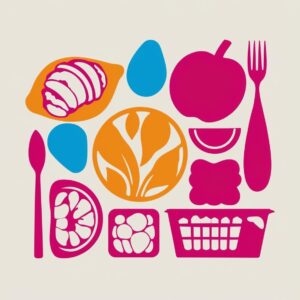Fueling Your Body:
Understanding Calories, Carbohydrates, and Proteins
When it comes to nutrition—especially for those who run, train, or live active lifestyles—understanding how your body uses calories, carbohydrates, and proteins is essential. These three elements form the core of what fuels your daily energy, supports muscle function, and maintains overall health. Whether you’re training for a race or just trying to feel your best, knowing what to eat (and how much) can make all the difference.
What Are Calories?
Calories are a unit of energy. They represent the amount of energy your body receives from food and beverages. Every person needs a specific amount of calories per day to support their basic bodily functions (like breathing and digestion), plus physical activity like walking, running, or working out.
The number of calories you need depends on factors like:
- Age
- Sex
- Weight
- Height
- Activity level
For example:
- A moderately active woman might need around 1,800–2,200 calories per day.
- A moderately active man might need 2,200–2,800 calories.
Instead of focusing only on numbers, it’s more helpful to think of calories as the fuel that keeps your body running. The quality of your calories also matters, which is where macronutrients come in—especially carbohydrates and proteins.
Carbohydrates: Your Body’s Favorite Fuel
Carbohydrates (carbs) are your body’s preferred energy source, especially for your brain and muscles during physical activity. They break down into glucose (sugar), which your body uses immediately or stores in muscles and the liver as glycogen.
How much do you need?
- For regular activity: 45–65% of your daily calories should come from carbs.
- Runners and athletes may need more, especially during heavy training periods.
That means if you eat 2,000 calories a day, 900–1,300 calories (or 225–325 grams) should come from carbohydrates.
Good sources of carbs:
- Whole grains: brown rice, quinoa, oats
- Fruits: bananas, berries, apples
- Vegetables: sweet potatoes, corn, peas
- Legumes: lentils, beans
- Dairy: milk, yogurt
✅ Sample meal for carb-rich energy:
- Breakfast: Oatmeal with sliced banana and a drizzle of honey
- Lunch: Whole grain wrap with grilled vegetables and hummus
- Snack: Apple slices with peanut butter
Carbs are not the enemy—in fact, they’re vital for sustained energy, especially before and after a run.
Proteins: Building and Repairing Your Body
Protein is essential for building and repairing muscles, especially after workouts. It also helps with immune function and hormone production.
How much do you need?
- General guideline: 0.8 grams per kg of body weight for sedentary individuals
- Active people or athletes: 1.2–2.0 grams per kg
For a 70 kg (154 lb) active person, that’s about 84–140 grams of protein per day.
High-quality protein sources:
- Lean meats: chicken, turkey, lean beef
- Fish: salmon, tuna, cod
- Eggs
- Dairy: Greek yogurt, cottage cheese
- Plant-based: tofu, lentils, chickpeas, tempeh, quinoa
✅ Sample protein-packed meals:
- Post-run breakfast: Scrambled eggs with spinach and whole grain toast
- Lunch: Grilled chicken salad with chickpeas, mixed greens, and vinaigrette
- Dinner: Stir-fried tofu with broccoli, carrots, and brown rice
Remember to space your protein intake throughout the day for better muscle recovery and absorption.
Pairing Your Nutrients
The best meals are balanced and combine all three macronutrients: carbs for energy, protein for recovery, and healthy fats for long-term energy and vitamin absorption.
✅ Example of a balanced plate:
- Grilled salmon (protein + healthy fat)
- Quinoa (complex carbs + protein)
- Roasted sweet potatoes (complex carbs)
- Steamed broccoli (fiber + vitamins)
This kind of meal helps you stay full, energized, and focused.
Food Sample Plan for One Day (Approx. 2,200 calories)
Breakfast
- Oatmeal (1/2 cup dry oats)
- 1 banana
- 1 tbsp peanut butter
- 1 boiled egg
🟰 ~450 calories | 60g carbs | 15g protein
Lunch
- Brown rice (1 cup cooked)
- Grilled chicken breast (4 oz)
- Mixed greens with olive oil dressing
- 1 small apple
🟰 ~600 calories | 65g carbs | 35g protein
Snack
- Greek yogurt (1 cup, plain)
- Handful of almonds
🟰 ~300 calories | 15g carbs | 20g protein
Dinner
- Baked salmon (6 oz)
- Quinoa (1 cup cooked)
- Steamed veggies
- 1 slice avocado toast
🟰 ~700 calories | 55g carbs | 40g protein
Evening Snack (optional)
- Cottage cheese (1/2 cup) with berries
🟰 ~150 calories | 10g carbs | 12g protein
Use Our Free Calculators to Customize Your Intake
Everyone’s nutritional needs are unique, and while general guidelines are helpful, your own numbers will depend on your body, goals, and routine. On our website, we offer a collection of free fitness calculators to help you tailor your nutrition:
- Calorie Needs Calculator
- Protein Intake Calculator
- Carbohydrate Estimator
- Water Intake Tracker
- BMI and Body Firmness Calculators
👉 These tools are designed to help you make informed choices—whether you’re trying to maintain energy for daily runs, recover after training, or improve your overall health.
Please Note:
We are not certified nutritionists or medical professionals. All information provided here is based on publicly available research and general wellness guidance. For personalized dietary advice or medical conditions, please consult a licensed healthcare provider or dietitian.


Leave a Comment